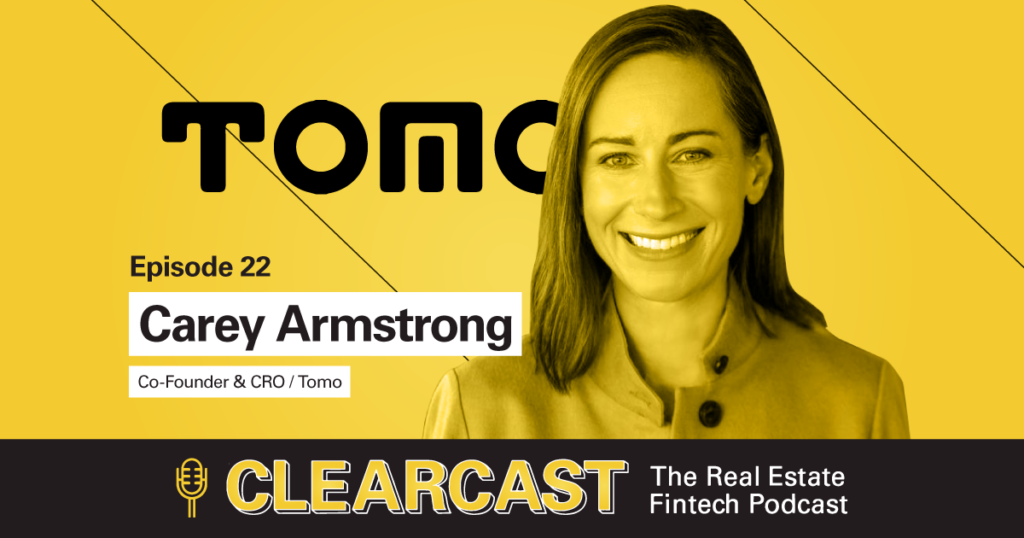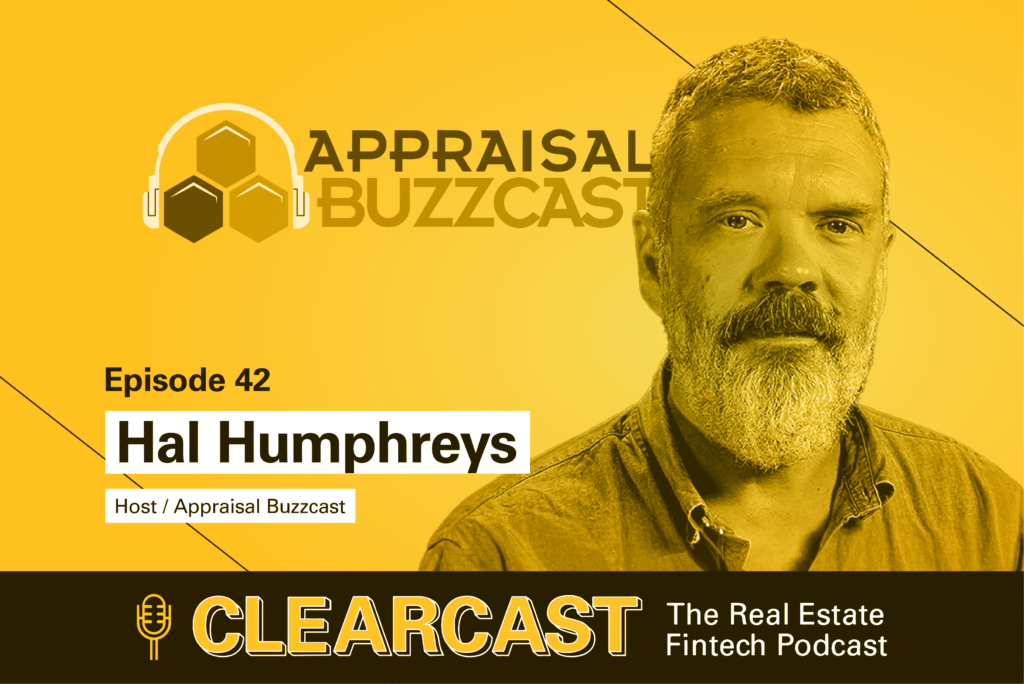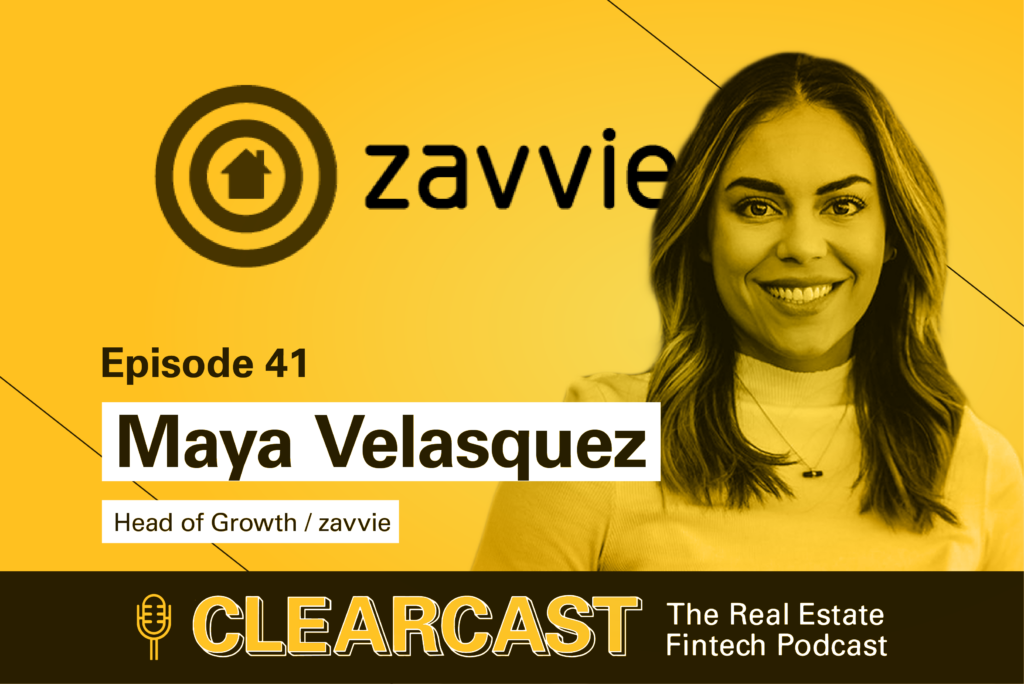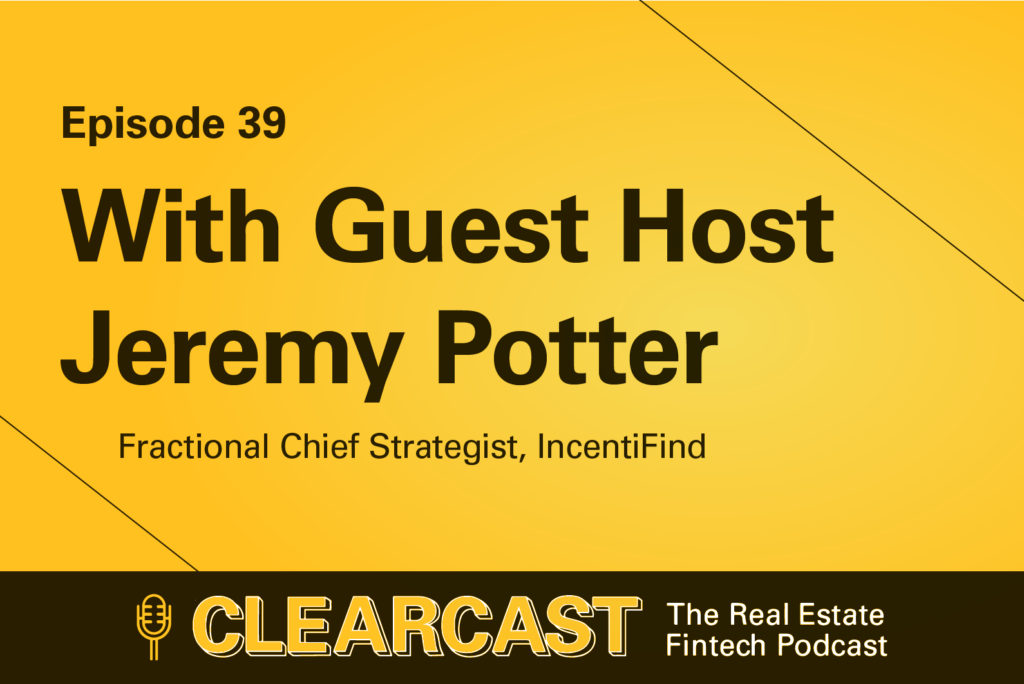🎙️ Follow ClearCast on LinkedIn, Twitter, Facebook, and Instagram. 🎙️
EPISODE SUMMARY
Jeff and Kenon discuss rapidly increasing home equity and what this means for first-time buyers. Jeff gives us a real estate joke roundup. Interview with Tomo Co-Founder and CRO Carey Armstrong.
Watch ClearCast E22 👇
Listen to ClearCast E22 👇
Read the ClearCast E22 transcript 👇
Jeff Allen
Hello and welcome back to ClearCast, the Real Estate Fintech Podcast. I am Jeff Allen. I’m joined as always by my friend and colleague, Kenon Chen. Kenon, how are you?
Kenon Chen
I’m doing good. Can I be Jeff Allen next time?
Jeff Allen
You know, I’m asked that question a lot. I would gladly trade places with you at any time Kenon, because you are a cool dude.
Kenon Chen
Well, I think that you’re pretty cool. And that ends the self back patting segment of the podcast.
Jeff Allen
Now back to griping at each other. So we’ve got a really fun show. This is episode 22. And we’re gonna be joined by a great guest, we’re gonna be joined by Carey Armstrong, who is the co-founder and Chief Revenue Officer of Tomo. Very exciting new company in the mortgage and real estate space. But before we do that, we are going to talk about some stories from the news and maybe a real estate joke of the pod!
Kenon Chen
It’s like we’ve done this before.
Jeff Allen
It is. So, Kenon, a major story that’s been happening in our industry for more than a year is the general trend of extremely rapid home price appreciation. And the latest numbers from Clear Capital ourselves, from our Home Data Index Market Report, which tracks repeat sales, using our own proprietary analytical process indicates that in November 2021, the year-over-year home price appreciation for the whole country was 20.2%.
Kenon Chen
What!
Jeff Allen
That is bonks. And the people who work at Clear Capitol know that I like to say bonks instead of bonkers. So, it’s pretty big. It is showing some signs of tapering. As we’ve talked about that, you know, the rate of increase is going to slow. But we are still at an extremely, extremely high rate of home price growth. And the accumulation of that consistently over the last, you know, 18 months or so is really starting to have an impact. So we’ve got two news stories, one demonstrating the kind of exciting positive flip side of home price appreciation, and then a little bit on the negative side. So on the positive side, homeowners in the third quarter of 2021 gained more than 250 bajillion dollars in equity in their homes. I’m sorry, that B probably means billion, just billions.
Kenon Chen
Yeah, the the bajillion part — that’s extra. Yes.
Jeff Allen
And this is according to our good friends at Black Knight. The amount of home like home equity available to mortgage holders, who retained at least 20% equity stake in their home rose by more than $250 billion in the third quarter and overall tappable home equity increased by 32% in the last year, for an aggregate total of $9.4 trillion dollars of tappable home equity.
Kenon Chen
Wow. That is incredible numbers. You know, I think, it goes on to say how are people actually tapping into that equity. It states that it’s actually at the highest rate in more than 14 years. But it’s mainly through cash out refis, not yet through second liens or home equity lines of credit. So, yeah, it definitely is increasing the rate that people are tapping into that, and that seems like it’s just gonna keep growing.
Jeff Allen
It does. And it feels like a positive story when you read it, like oh, cool. People get access to have more financial stability. Their assets are increasing in value that sets them up better for retirement. But there is a bit of a negative flipside to this Kenon, and you’re going to share with us a little bit of an article on that.
Kenon Chen
Yeah, in terms of the positive side first, people are looking at their home equity every day now. You know, it’s interesting how we’ve kind of gamified, you know, getting your credit scores and gamified knowing about your finances in a way. And so because the appreciation is going up so rapidly on a daily basis, people are probably checking into this now and like, how much is my home worth? How much is my home worth? And so you could see how people, you know, could be planning out: “Well, what am I going to do with that next year? Home improvements? Where should I put that money?” And thinking about those sort of things, which is great if you’re a current homeowner, but if you are looking to maybe buy your first home, things look pretty different for you. In fact, from an affordability standpoint, it talks about that it now requires 22.4% of a median income to purchase an average price home with 20% down. And that’s on a 30-year mortgage. So a huge chunk of income needed, which means less and less people are going to be able to afford that 20% down on a purchase. We looked at last year’s appreciation from last year to now with that 20% price increase. I mean, if I’m thinking about this, right, you almost have to bring twice as much cash to the table to get into a 20% down mortgage. That makes it super difficult as a first time homebuyer
Jeff Allen
Yeah, absolutely. And you know, almost all of us when we bought our first homes went through a pretty serious scrimping and saving and planning process just to scrape together what you could. So the idea of that number — of that amount you need to get — doubling sounds like it’s going to make it harder for people to get into the whole buying process.
Kenon Chen
And this also, you know, by seeing so much equity available and seeing that while it might be cooling off a little bit, that it’s still going to keep increasing for a bit. It makes sense why there’s so many different companies now, you know, looking to provide alternative ways to tap into that equity, not through just a traditional cash out refi or HELOC, but be able to tap into it through home equity investment, you know, other types of Proptech-like offerings.
Jeff Allen
Well, something we will continue to be monitoring. Kenon, would it be acceptable to you, at this moment if we very briefly did a real estate joke?
Kenon Chen
Do I have a choice?
Jeff Allen
Nope.
Kenon Chen
Okay, then let’s proceed.
Jeff Allen
Okay, so we are going to try something slightly different. Instead of giving you an original joke, I’m going to share with you a series of jokes that I found on the internet. I have personally curated these jokes because they are quite simply the weirdest real estate jokes that I have found on the internet.
Kenon Chen
So if this was on your Spotify account, this would be your weirdest jokes playlist.
Jeff Allen
Correct. Okay. And I will say that I have done more Googling of the terms real estate jokes and mortgage jokes than probably anyone in the world. So I am well educated in what’s out there. So you can trust that my Spotify playlist is well-curated.
Kenon Chen
I’m sure that no one else in the world has spent as much time on real estate jokes as you Jeff. I’m convinced of it.
Jeff Allen
Okay. So what follows are the four weirdest jokes that I have ever read on the internet pertaining to real estate or mortgage.
Kenon Chen
I’m a little concerned but yeah, go for it.
Jeff Allen
Joke number one. A dog used to live in a clay brick house, but was evicted for not paying his mortgage. What would you call this? A dog used to live in a clay brick house, but was evicted for not paying his mortgage.
Kenon Chen
I don’t know. A dog house?
Jeff Allen
Very incorrect. It’s like as incorrect as you could possibly get. The answer is a dobe’s Adobe abode owed dough.
It’s like a Doberman Pinscher’s Adobe abode — clay house.
Kenon Chen
Yes?
Jeff Allen
Owed dough. He’s owed money on the house. A dobe’s Adobe abode owed dough
Kenon Chen
You need to say it faster. That’s what makes it funny.
Jeff Allen
A dobe’s Adobe abode owed dough! This is available if you Google around you’ll find this joke. It’s out there on the sites.
Kenon Chen
I don’t have that much time but yes, okay.
Jeff Allen
Well, I did it for you. Okay, Joke number two — second weirdest joke. What do you call an aging actor who has finally paid off his house?
Kenon Chen
I don’t know.
Jeff Allen
Mortgage Freeman. Like what? Why is that a joke? That’s not even close to the actor’s name. Morgan Freeman probably pay off his house a long time ago. It’s not relevant. It’s a weird joke.
Kenon Chen
That’s not so bad. That’s not so bad. That’s definitely better than the first babbling nonsense that was disguised as a joke. Okay.
Jeff Allen
All right. Here’s two more.
Kenon Chen
Mortgage Freeman.
Jeff Allen
Yep. What do you call Macaulay Culkin’s Italian mortgage?
Kenon Chen
Home job?
Jeff Allen
*In Italian accent* Home Alone. Get it? It’s Italian. Home Alone!
Kenon Chen
Oh my god. No. No.
Jeff Allen
This is on the internet! I read it. It exists on multiple joke aggregation platforms.
Kenon Chen
We might have to pull the plug on this whole podcast.
Jeff Allen
Okay, and last one. What do you call Macaulay Culkin’s second Italian mortgage?
Kenon Chen
There’s two?
Jeff Allen
*In Italian accent* Home Alone two. It was almost as good as the first. He was lost in New York at that one. Remember, his uncle had an abandoned house in Brooklyn that he got access to and he set up like a whole thing to get Daniel Stern and Joe Pesci.
Kenon Chen
You know the worst part about this? This is my day job. Yeah, I can’t even quit. I can’t even quit.
Jeff Allen
No, you’re stuck.
Kenon Chen
Well, thank you?
Jeff Allen
Yeah, you’re welcome.
Kenon Chen
All right, well, we are excited today to have a special guest. Joining us today we have Carey Armstrong, who is the co-founder of Tomo. And just to give her a little bit of an introduction, she before co-founding Tomo, she was the vice president of the premiere agent group at Zillow. And she led a huge business, a billion-dollar business at Zillow. But then she now is part of a pretty amazing startup, focusing on revolutionizing the lending experience — being a digital lender — called Tomo. And we want to hear more about that. And thank you for joining, Carey.
Carey Armstrong
Thank you. Thanks very much for having me, guys.
Kenon Chen
So tell us a little bit about that transition. I mean, you were in a pretty successful role at an established, you know, major player in real estate, how did you make that leap from from there to co founding a startup?
Carey Armstrong
I’d been at Zillow for quite some time, I was there for seven years. And it had grown a ton during my tenure, I think it was 300 or 400, when I joined, and it was 4,000 or 5,000, when I left. And so as you can imagine, you know, very different company. And there was a lot that I wanted to do that didn’t make a lot of sense given Zillow’s focus and strategy at that time, things that I wanted to do to change the way people buy homes. You know, in premiere agent, the focus was very much on introduce the consumer to an agent, and then the agent and their partners take it from there. And that really doesn’t give Zillow a lot of influence over what the customer’s experiences is other than like a brief phone call. And even that it’s hard to influence. And I was really craving driving something a little bit deeper, being able to really feel confident that the buyer was going to have a great experience. And so as Zillow got bigger, and as I became more convinced that someone should make sure that buyers actually have a great transaction and experience. My co-founder Greg Schwartz decided to leave Zillow. And when he did that, the two of us started talking about, well, gosh, what could we do, other than Zillow. And it became clear there were lots of options. And so that was not a hard jump for me to make. It was it was pretty easy to say see that Greg and I, with all of our experience in real estate and in mortgage because Zillow had mortgage as well, could really change the way that buyers bought homes in America and deliver not just a great introduction to an agent, but an actual awesome experience all the way up to close.
Jeff Allen
Yeah, I was racing to get my mute button. Your answer was shorter than I expected. Kudos. So you’ve talked about how you were trying to create, you know, a new home buying experience, and you weren’t having that itch scratched enough where you were and you wanted to go about setting about doing that with dedicated focus. So what in specific feels most broken to you? Like what what is truly broken that you guys are trying to attack?
Carey Armstrong
I mean, we are all about the overall transaction. But when it comes to buying a home, the part that is the worst, that is the train wreck of the home transaction is by far mortgage. And that’s why we’re starting, you know, you could start just by helping people find a great agent. And that’s really important. And we actually do that too. But the worst part is mortgage, and it really brings the whole transaction down. And so that’s what we’re focused on. And of course, you know, to solve mortgage, you have to get involved in a lot of other areas, too. You have to think about appraisal, you have to think about title and escrow, you have to think about things you never thought you’d think about like flood insurance. But if you can make mortgage better you can really influence how people feel about the process of buying a home. And we think that if you can make mortgage painless, you can let people focus on what colors they’re going to paint the walls and what sofa they want to buy and how they’re going to pack up all their earthly belongings. And that’s a really big lift too. And it’s the kind of thing that people should be able to focus on when they’re buying a home. So eventually we’ll cover everything but boy mortgage is some pretty heavy lifting in the meantime, it’s a it’s a complex space.
Kenon Chen
It’s a deceivingly complex space too, right? It’s like the iceberg that sunk the Titanic.
Carey Armstrong
Totally! There are so many companies that have mortgage businesses that are kind of like a side hustle for them. And none of those businesses seem to go very far. We really think that you have to major in mortgage, not minor in mortgage, which is why it’s what we’re solving with single-minded focus in the beginning.
Kenon Chen
Yeah. And there’s been this kind of movement in mortgage, you know, the idea of digital mortgage, right, like, a lot of people were talking about digitizing the process between real estate and all the way through to the mortgage and gonna fix it. Is there something missing with that thinking of like, if we just digitize it, then all the problems will go away? Like, what’s missing and really making that solution?
Carey Armstrong
Absolutely, we should digitize mortgage, there’s no question. But boy, the number one worst way to digitize mortgage would be to take existing mortgage processes and practices and just pour cement on them and automate them. You know that would be a travesty, you would end up with really inefficient practices that are really bad for customers being followed every single time with no room to even flex, that sounds terrible. But I even more importantly than that, not everybody wants a fully digital experience. And even if they say they want a digital experience, they want to have the option to reach out to a human being who’s a specialist in what they’re doing for help. And so we don’t, we don’t think about ourselves as having just a tech experience for customers, we think of humans plus tech, every step of the way. You know, our experience is built around the assumption that there needs to be an amazing advisor available at any point. And those advisors need to form great relationships with customers as much as the customers want. And that, you know, they have to be able to communicate over modern channels, you know, our loan advisors talk to customers in the chat experience on our site, they text them all the time, like the kinds of things that you don’t get from a Wells Fargo. You know, we want advice and relationship to be integrated really deeply into this digital experience, because it’s the biggest purchase of your life. And it’s by far the most stressful thing you’re doing at any given moment while you’re buying a home. And so we think having humans to advise you is critical.
Jeff Allen
Yeah, that’s absolutely correct. Technology only gets you so far, there certainly has to be a human touch to bring it all home. You guys are interesting because you’ve had a lot of experience in real estate in both your past careers. But also there’s kind of a real estate component to what Tomo is doing to a degree. And then now you’re really focused on mortgage, a lot of people tend to think of those as being two different verticals. But there’s more and more companies starting to blur that line. And we’ve we’ve been exploring that on this podcast with guests. And you guys are a great example. Right? There’s this gap between the real estate process and the mortgage process, and there’s people trying to fill that gap. What do we need to do as an industry to bridge that gap between the home buying experience and the lending experience, if they’re at odds with each other sometimes?
Carey Armstrong
They really are, I mean, for most mortgage companies, mortgage is just a financial instrument. And it’s, you know, especially the more refi they do, the more that’s true, you know, they don’t think about purchase at all, they assume that the mortgage has no deadline, which is a problem when they finally do get into purchase. And they think about real estate only when the refi market dries up. And they have to start pursuing relationships with agents and agents say, “Aren’t you the guy who said you couldn’t close my loan, because you were so busy with refi?” And that’s it’s a hard way to swing temporarily. And as I mentioned earlier, you know, lots of real estate companies have mortgages arms, that they they don’t think about that much, because they’re so complex and so different, and it’s really hard to do them sort of on the side. But I personally, I think the number one thing that we have to do to bring mortgage and real estate together is recognize that purchase mortgage is different from refi mortgage, and that it’s not the same process. It might not even be the same team. Maybe it’s the same technology — we’ll see. But you know, when we sat down to design, our mortgage process, there are a lot of things that we just did differently because we wanted to do only purchase a great example: When the customer says they’re ready to move forward with us, we order the appraisal right away. We don’t wait for an inspection to have happened. And if the customer doesn’t go through with the deal, that’s fine. We’re gonna eat the cost, we’re not going to build them for it. It is important enough to us to get the appraisal going instantly, that we will eat that cost because we close on time — I’m not kidding — we close on time, 100% of the time. And so redesigning the process to make sure that happens because you’re in purchase and agent relationships are so critical and agents have memories like elephants, that’s really different. So personally, I don’t believe that a company can do both purchase and refi. I think they have to say I’m about real estate and mortgage at the same time which equals purchase mortgage and just focus solely on that.
Kenon Chen
Well, that’s ambitious but also focused, which we love. How do you take kind of your, your experience, like you said it being a massive incumbent like, 4,000 to 5,000 employee company, and then you know, what’s that been like to transition that to, you know, starting from, if you will. And any lessons learned or…?
Carey Armstrong
It’s so different. It’s so different. Gosh, you know, I had 500 people on my team at Zillow. And you know, we’re about 125 right now, which feels like artisan, you know, every hire you make has such incredible impact on the culture of the organization and the results of the organization. And yes, that’s true in a big company, too. But you know, it doesn’t swing quite as much. You know, you got to be patient, right? You know, you think about all these things you wish you could do, and you recognize you’re not going to do them quite as fast. But you also have all the upside of always focusing on the very most important priorities, because you can only do so many things when you have less capacity. And that is really fun. You know, I used to work in strategy consulting. And I used to say that my job was great, because I worked on every client’s most important problem, because they don’t hire consultants for the unimportant ones, right? And it’s kind of like that at a startup you are, you are working on your most important things all the time that the other stuff comes later, because you don’t have 5,000 people to do everything in the world. I love that focus.
Jeff Allen
And you mentioned how impactful a small company’s hires are on culture. That’s certainly true. And given the enormity of the challenge you guys have in front of you of trying to revolutionize real estate and, you know, really change the way the mortgage process is done, as you’re hiring and as you’re creating your culture, are there specific mindsets, or aspects of culture that you’re trying to focus on?
Carey Armstrong
Yeah, you know, there are different things that we emphasize for our mortgage, sales, and operations team versus the rest of the org, because, you know, I honestly, because we’re hiring, when you’re hiring from mortgage, there are things you have to sort of take into account as far as likely background and try to correct for. Whereas, in the product organization, for example, you know, like — I’ll be more specific. In product, most of our product hires come from tech companies, tech companies are really customer-focused, the classic, to be customer-obsessed in a tech company, that is not as often the case in a mortgage company. And so I don’t have to worry about that when I’m talking to a product manager or an engineer. But when I’m talking to a processor, I definitely have to screen really hard for that. And look for people who are frustrated that you know, that the company they’re at is letting closing dates slip and you know, buyers are moving across the country ready to move in, and they can’t, and they have to find a hotel to stay at for a week or two. And similarly, I have to find folks on the mortgage side who are really open minded, because we’re trying to change how mortgage is done. And then I’m looking for folks who are a little bit frustrated, because they can see that there’s a better way to do things, and they want to go find a place to do that. So someone who’s very customer-oriented, and also very flexible and open minded is really critical for mortgage. And then in other functions, it’s more about are you willing to go and learn something as crazy and complex as mortgage? And are you okay knowing the Fannie Seller’s Guide is this big. And you might actually have to flip through it at some point! And it’s not just some social app where you get to figure everything out on your own instantly, you know, that you have to take things a little bit incrementally. So very different things in different roles.
Kenon Chen
Do you have like a pain tolerance exam that you give?
Carey Armstrong
Yes, exactly! I really, truly did. I was talking to a director of product candidate the other day and I took out the Fannie Seller’s Guide that I have in a big binder and I showed it to him just to make him understand what we we’re up against.
Kenon Chen
Oh, man!
Jeff Allen
You probably scared him! He probably ran away as fast as possible.
Carey Armstrong
I haven’t heard from him since so I don’t know. I don’t know if that worked!
Kenon Chen
Yeah, I mean, have you run into people who have kind of fallen in love with the status quo? Where they’ve accepted it so much that it’s like, oh, well, you just have to understand that that’s the way it is. You’re gonna miss closing dates and times like, right, like, shouldn’t you be okay with that?
Carey Armstrong
Yeah, absolutely. Lots and lots of people. And honestly even the people who are interested in changing mortgage and excited to do it, there are lots of old habits that are hard for them to break too. For example, it’s very common for me to ask a question here. Well, the industry standard is to X. And the longer people are here, the more used to it they get when I respond, “Okay, but why is that the industry standard? And what does that lead to? And is that do we have another option?” Recently, I think it was maybe last month, we really surprised a bunch of our team, when we announced that we were going to cap how many loans we closed in November, and turn away some business. And they were not used to that they had not seen that happen before. But we took a look at our operational capacity. And we said demand is exceeding supply, we can only close on time, if we turn away the next couple loans that we’re getting. And anything else that comes in after this point, we’re just not going to do and they had not seen that before. One person said he’d seen it once. And even he was still a little bit nervous. But we had to explain why, you know, we are closing on time 100% of the time. And that means that if demand gets ahead of supply, we we have to turn away business. And it doesn’t really mean we’re turning the customers away, it means they can’t close that month, they need to close a couple weeks later.
Kenon Chen
Wow! Well, we were at the Blueprint conference together and got a chance to connect there a little bit and I kept hearing, you know, rave reviews from when you were on stage speaking there. And it was like, “Oh, my gosh! Have you heard Carrie Armstrong?” You know, and it was it was super cool that apparently you were able to be, I think inspiring to folks that are even in an earlier stage startup. And you guys have been successful securing funding. And speaking to our founder listeners right now, like any any insights you would share to folks that are just just starting their companies and kind of looking to get that first round?
Carey Armstrong
Oh, great question. So I would say that, you know, our success in funding was probably a combination of finding a really big market, finding a reason why we could win in that market, and then that being aligned with our backgrounds. And I know that those three things aren’t always easy to get lined up. But the better that you can, the easier time you’ll have. The other thing is, you know, we found some investors who know us and really got to know us even better than they had before as founders, you know. Pete Flint, the partner at NFX, you know, was the CEO of Trulia and I was the head of corp dev at Zillow when we bought them. And that was really handy. And gosh, Nick Huber at Ribbit actually reached out to Greg and me after we left Zillow separately to say, “Hey, what are you doing next, I’d love to invest.” When it became the same enterprise, he was like, that’s even better. So you know, and those guys, you know, from the fintech side, and the real estate side, and we’re at the intersection of the two, they really understand why what we’re doing works. And so it wasn’t an uphill battle to explain the model to them, they were instantly excited about it, because they could see, they could see why it made sense. And so finding investors who get why what you’re doing makes sense is so essential.
Jeff Allen
So we always like to close out these conversations with a look at the future, which is over this way. We’re on the right, not the left. Yes, it’s like reading left to right. So what is next on the horizon for Tomo? You guys are really just getting started, you know, figuring out, get your footing under you starting to starting to scale what’s on your roadmap that you are most excited about?
Carey Armstrong
Oh, that’s a great question. Um, you know, it’s a combination of even faster approval for customers, you know, where they have to do less to get to a decision more quickly. And honestly, just making Tomo available to more customers. Today, we’re in Texas and Washington, and we would love to be in more markets. So that’ll come pretty soon. And that’s really exciting. And boy, there’s a lot happening in mortgage these days that we’re also excited to take advantage of. And that’s going to all of it’s going to make it easier to close faster and close more reliably on time.
Kenon Chen
Awesome. Well, I mean, I feel like that went by super fast. You know, I wish we could talk more because, you know, it’s just exciting to hear your perspective. Thanks for taking the time and we’re gonna keep an eye on on where Tomo is going, absolutely. Appreciate it.
Carey Armstrong
This was really fun. Kenon, Jeff, thank you so much.
Jeff Allen
Yeah. Thanks, Carey!
Carey Armstrong
Thank you!






